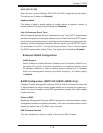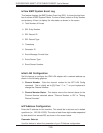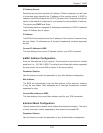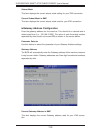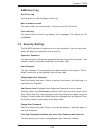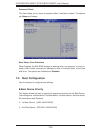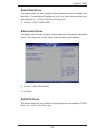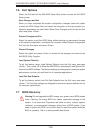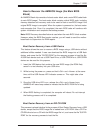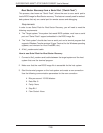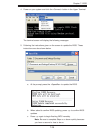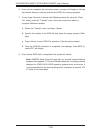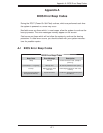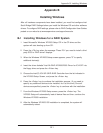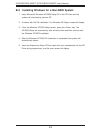
Chapter 7: BIOS
7-27
How to Recover the AMIBIOS Image (the Main BIOS
Block)
An AMIBIOS fl ash chip consists of a boot sector block, and a main BIOS code block
(a main BIOS image). The boot sector block contains critical BIOS code, including
memory detection and recovery code to be used to fl ash a new BIOS image if the
original BIOS Image is corrupted. When the system is powered on, the boot sector
code executes fi rst. Once it is completed, the main BIOS code will continue with
system initialization and complete the bootup process.
Note: BIOS Recovery described below is used when the main BIOS block crashes.
However, when the BIOS Boot sector crashes, you will need to send the mother-
board back to Supermicro for RMA repairs.
Boot Sector Recovery from a USB Device
This feature allows the user to recover a BIOS image using a USB device without
additional utilities needed. A user can download the BIOS image into a USB fl ash
device, and name the fi le "SUPER.ROM" for the recovery process to load the fi le.
A USB fl ash device such as a USB Flash Drive, a USB CDROM or a USB CDRW
device can be used for this purpose,
Insert the USB device that contains the new BIOS image (the ROM fi les) 1.
saved in a root directory into your USB drive.
While turning the power on, press and hold <Ctrl> and <Home> at the same 2.
time until the USB Access LED Indicator comes on. This might take a few
seconds.
Once the USB drive LED is on, release the <Ctrl> and <Home> keys. 3.
AMIBIOS will issue beep codes to indicate that the BIOS ROM fi le is being
updated.
When BIOS fl ashing is completed, the computer will reboot. Do not interrupt 4.
the fl ashing process until it is completed.
Boot Sector Recovery from an IDE CD-ROM
This process is almost identical to the process of Boot Sector Recovery from a USB
device, except that the BIOS image fi le is loaded from a CD-ROM. Use a CD-R or
CD-RW drive to burn a CD with the BIOS image fi le in it, and name the fi le "SUPER.
ROM" for the recovery process to load the fi le.



